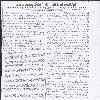| Source | Article from "¯ycie Warszawy" |
| Event referred to | the Treaty of Rome |
| Technological characteristics | Type of file: image
Extension: *.jpg
Dimension: 976kb
|
| Description of the source | Kind of source/: Newspaper article
Origin of the source: Archive
Language: Polish
Copyright issues: full availability
|
| Contextualisation of the source | The article ‘Good and bad sides of common market” by Grzegorz Jaszuñski describes the beginning of cooperation in Europe. It has its roots in Schuman’s plan for deeper cooperation in the form of the European Coal and Steel Community and the act of signing the Treaty of Rome which is dated as the creation of ‘common market’. The author also portrays the six founders’ struggle with difficulties and opponents of the integration at the times when Europe is divided by a cold war between east and west. |
| Interpretation of the source | The author seems to be opposed to the idea of common market. Even though he highlights some benefits which would result from common market, he mainly concentrates on problems it will possibly cause and claims that this incentive tends to separate Europe instead of merging it into one organism. He simply does not find the idea of creating EC with the purposeful omission of the socialist countries as any common good and produces ominous forecasts of European integration |
| Original Contents | Autor w swoim artykule wspomina o wykazywanych do niedawna w¹tpliwoœciach wobec formuj¹cej siê Europejskiej Wspólnoty Gospodarczej i przyznaje, ¿e okaza³y siê one bezpodstawne, a pañstwa, które zdecydowa³y siê przyst¹piæ do projektu, tylko na tym skorzysta³y – wskaŸniki gospodarcze tych krajów by³y wy¿sze ni¿ innych pañstw kapitalistycznych. Na podstawie trzech najwa¿niejszych postanowieñ Traktatów Rzymskich stara siê wyjaœniæ g³ówne w¹tpliwoœci dotycz¹ce tworzenia siê EWG. Wspomina o kontrowersyjnej sprawie zniesienia barier celnych miêdzy pañstwami cz³onkowskimi. Opisuje sytuacjê i proponowane rozwi¹zania dla terytoriów zamorskich znajduj¹cych siê w posiadaniu Wielkiej Brytanii i Francji. Wylicza za³o¿enie jakich instytucji przewiduje siê dla zapewnienia poprawnego funkcjonowania programu.
Problemem jest te¿ fakt, ¿e obecne przemiany pog³êbi¹ podzia³ Europy. Jednym z postanowieñ traktatu jest to, ¿e do wspólnoty nie mo¿e przyst¹piæ ¿adne pañstwo o ustroju socjalistycznym. Wyklucza to pewn¹ grupê krajów z podjêcia negocjacji. Formuje siê te¿ opozycyjny uk³ad, zaproponowany przez Zwi¹zek Radziecki, mówi¹cy o rzeczywistym zespalaniu pañstw europejskich na podstawie wspó³istnienia ró¿nych ustrojów. Jednak jak dot¹d, ¿adne pañstwo zachodnio – europejskie nie wyrazi³o zainteresowania tym projektem.
W zakoñczeniu autor powstrzymuje siê od wydawania opinii na temat perspektyw wspólnego rynku. Wyra¿a przypuszczenie, i¿ w razie rozluŸnienia siê sytuacji w polityce miêdzynarodowej (co wydaje siê bardziej prawdopodobne) EWG bêdzie dzia³a³a wy³¹cznie jako wewnêtrzny organ 6 pañstw, nie bêdzie mia³a ¿adnego wp³ywu na politykê Europy.
W skrócie opisany jest proces negocjacji, które odby³y siê przed podpisaniem porozumienia – wynika z niego, ¿e uzyskanie kompromisu by³o trudne – trwa³o ponad dwa lata. Autor zaznacza, ¿e, mimo sprzeciwów ze strony grup przemys³owych oraz handlowych pañstw zainteresowanych, niektóre z nich dostrzeg³y szansê dla siebie na rozwój i zwiêkszenie wp³ywów. Rzetelnie wymienia te¿ trudnoœci, jakie napotka³a i napotykaæ jeszcze bêdzie formuj¹ca siê Wspólnota. S¹ to m. in. krytyczne g³osy prasy zachodnio – europejskiej, a tak¿e ³atwe do przewidzenia problemy z ratyfikacj¹ postanowieñ we wszystkich 6 krajach. Nie ma w¹tpliwoœci, ¿e bêdzie to proces trudny i d³ugotrwa³y.
|
| Original Contents (English Translation) | In his article the author mentions recently expressed doubts about the constituting European Economic Community, admitting that they were unsubstantiated and that the countries that decided to join the enterprise have only benefited from that fact, with their economic indicators looking better than those of other capitalist countries. On the basis of the three most important resolutions of the Treaty of Rome, the author attempts to clarify main uncertainties concerning the formation of EEC. He remarks a controversial issue of the abolition of customs barriers between member countries. He delineates the situation and solutions proposed for overseas territories belonging to Great Britain and France. He names institutions that need to be created in order to facilitate a correct functioning of the project.
Concisely described is the negotiation process that took place before the agreement was signed – it appears from it that arriving at a compromise was difficult, having taken two years. The author emphasizes that despite the opposition voiced by industrial and trade groups of the countries concerned, some of them noticed a chance for their development and for increasing their influences. He also honestly enumerates difficulties that the still-forming community has had and still is to face. Among them are critical opinions expressed by the West-European press as well as easily predictable problems with ratification of the provisions of the treaty in all six countries. The process is bound to be difficult and long-lasting.
Another problem is the fact that the present changes will broaden the gap in the division of Europe. One term of the treaty states that no socialist country can join the community. This excludes a certain group of countries from proceeding with negotiations. An opposing agreement is forming, proposed by the Soviet Union, proclaiming genuine unification of European countries on the basis of cohabitation of different political systems. However, no Western-European country has so far expressed interest in the project. In conclusion, the author refrains from stating his opinion on the prospects for the common market. He expresses a supposition that in the case of relaxation of situation in international politics (which seems more likely) EEC will be functioning solely as an internal body of six states, having no effect on European politics
|
